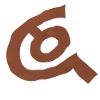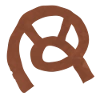
The Steppe Alphabet
Steppe Language is a fictional language spoken by the Kin in the universe of Pathologic. While containing some invented words, the language borrows many words from Buryat and Mongolian, as well as Tibetan.
Alphabet
| “ | The runes of the Steppe — the "long marks of Turokh" — could be considered the alphabet of the native people. They are more similar to "signs" than letters, with every mark having multiple meanings: each is "akin to a song" with layers of history attached to it.
Cattle are ritually branded with the symbols, and the rune can correspond to both the owner or the age of the bull. Branding a bull is a stage in an intricate ritual that spans years. |
„ |
| — Kickstarter update[1] |
Unknown Meanings
These symbols, referred to as "tavro" and "rune", do not currently have meanings applied to them, but are present in either the games or their promotional material.
Dictionary
A
- Aba (Аба) — father
- Abgai/Abgay (Абгай) — elderly sister/elderly woman
- Akhar (Ахар) — short, unequal
- Akshan (Акшан) — mother
- Amaa tat, khonzohon (Амаа тат, хонзохон) — shut your mouth, asshole [note: khonzohon doesn’t directly translate to asshole]
- Aman (Аман) — mouth
- Ankhadaghaa aman boloshohon (Анхадагhаа аман болошохон) — ... the mouth becomes/is ?
- Aydahamne khүrene / Aydahamni khurene (Айдахамни хүрэнэ) — fear, horror
B
- Baarhani (Баарhaни) — poor thing
- Bagshaa/Bagshaah (Багшаа) — teacher
- Bai Uraggha (Бай Урагга) — an old man in Steppe folktales, said to have the head of a bull and cow's hooves instead of hands
- Barbaaday (Барбаадай) — thumb
- Basaghan (Басаган) — girl, maid, bride
- Bayarlaa (Баярлаа/Бьярлаа) — thank you[6]
- Bayartay (Баяртай) — goodbye
- Baygalday (Байгалдай) — ? to miss the point (possibly derived from Mongolian байг алдах)
- Bayna (Байна) — to be, to exist[7]
- Be (Би) — I
- Be khara/Be kharanab (Би хара/ Би харанаб) — I see, I observe
- Be naydamtay bolokho (Би найдамтай болохо) — I am sure of it
- Be oylgono ugyb (Би ойлгоно угыб) — I don't understand
- Be tatgalzah (Би татгалзах) — I refuse
- Berkhe (Бэрхэ) — hard, difficult, complicated
- Bi khareeb (Би хэреэб) — I'm awake
- Bish (Биш) — no/not[8]
- Bide (Бидэ) — we[x]
- Bide kharaan (Бидэ хараан) — we see; behold, everyone
- Boddho (Бодхо) — Earth
- Bodozho baynam (Бодожо байнам) — I get up? /literal translation: I am thinking/
- Bohir (Бохир) — dirty, filthy
- Boleesh (Болииш) — stop, don't [do something]
- Bolokho (Болохо) — to become, to turn
- Booha (Буха) — bull[9]
- Boohe/Bookhe (Бүхэ) — strong, durable
- Boös (Боос) — someone bull-like or a master of bulls[10]
- Boozarlakhaa (Бузарлахаа) — to desecrate, to pollute, to soil
- Bos — bull
- Bos Turokh (Бос Турох) — the bull that created the world
- Bosooly/Bosooli (Босооли) —deserter, rat, refugee, runaway [x]
- Bou khara (Бу хара) — don't look
- Bou shagna (Бу шагна) — don't listen
- Buha-noyon (Буха-нойон) — auroch
- Byy (бүү) — don't [do something]
- Byy alysh (Бүү алыш) — don't kill
D
- Duugai (Дуугай) — silent[11]
- Dүү (Дүү) — younger sibling[7][9] or cousin
- Dүү khүbүүn (Дүү хүбүүн) — younger brother[9]
E
- Eghe-Gola (Эгэ-Гола) — the rise near the cattle breeding camps, days away from the Town. Eghe and gola mean, respectively, 'to return' and 'river'
- Ekhene (Эхэнэ) — woman
- Emshen (Эмшен) — doctor, healer; someone who knows the Lines[12] (a term of respect[13])
- Ene (Энэ) — this, that
- Ene shi yuun khun geeshebshe (Энэ ши юун хун гээшэбши) — what kind of person are you?
- Erdem (Эрдэм) — scholar, scientist; a wise man who doesn't know the Lines[12]
- Ereebshe (Ерээбши) — [someone] comes, derived from ерэхэ (to come)
- Esegher/Etseg eyh (Эсегер/Эцег эйх) — father
- Ezhe (Эжи) — mother
G
- Golghoy Khen (Голгой-хэн) — ? the former name of Andrey Stamatin's pub (possibly a small river)
- Golgur (Голгур) — ? the name of the spring in the Stone Yard; Vlad the Younger notes that "[t]he etymology of the word is unclear, but it means something along the lines of "a smooth mouthful""
- Gorkhon (Горхон) — river
H
- Holaeghe-ut golghoy ekh gerkhen syakhyl! Oluhn ekhe-barag! (Холэге-ут голгой эх герхен сяхыл! Олун эхе-бараг!) — ? dialogue which an angry butcher addresses to the Bachelor (Pathologic)
- Hoog-zhoya (Хугжойа) — music
- Hюmhan (Хюмхан) — fingernail[9][14]
I
- Ime beshe (Имэ бэшэ) — it's not that, it's not like that
K
- Khachirkhel (Хачирхэл) — strange things, impossible things
- Khamgyin khachirkhaltay zүyl yuu veh (Хамгийн хачирхалтай зүйл юу вэ) — what is the strangest thing in the world?
- Khandro (Кхандро) — ? (possibly divine being, derived from Tibetan)
- Khara bosooly (Хара босооли) — ? look at...
- Kharaa (Хараа) — to see
- Kharaldaa (Харалдаа) — to look, to see
- Kharyysh (Харыыш) — look past
- Khatanghe (Хатангэ) — the Kin; plural of Khatangher
- Khatangher (Хатангэр) — member of the Kin
- Khatar naada (Хатар наада) — dancing
- Khatar naada hoog-zhoya (Хатар наада хугжойа) — to dance to the music
- Khaya dee (Хайа дээ) — it is so
- Khayaala (Хаяала) — brother
- Khayratay inagni (Хайратай инагни) — beloved friend, dear friend
- Khayud (Хайюд) — big trouble
- Kheerkhen/Khөөrkhen (Хөөрхэн) — dear, dearest, cute
- Khelekhe (Хэлэхэ) — to talk; to tell (a story, a tale)
- Khetey (Хэтэй) — sister-elder[6]
- Khodo khara (Ходо хара) — it is clear, it could be clearly seen
- Kholboön (Холбоон) — link; to establish a link, a connection; a linked one
- Khooloy (Хоолой) — throat[7][9][15]
- Khurganuudni untarna (Хургануудни унтарна) — ? my fingers are numb
- Khybyyn (Хүбүүн) — son[9], boy
- Khyn/Khun (Хүн) — man, person, human being
- Khyygedi (Хүүгэди) — children
- Khyygedi be oshokho (Хүүгэди би ошохо) — to go to the children (to care for one's children)
- Khyyr (Хүүр) — carcass
M
- Mara (Мара) — an evil spirit; see also Shabnak (Pathologic)
- Mededeg zurlaa (Мэдэдэг зурлаа) — ? to know the lines
- Medene ugye, kharaa ugyb (Мэдэнэ угые, хараа угыб) — I don't know, I haven't seen [it] /or: “i’ll only tell you what i know”/
- Medenegshe (Мэдэнэгши) — ? conjugation of Mongolian мэдэх ("to know"). Likely imperative from context
- Medrel (Мэдрэл) — nerves[16]
- Mendee (Мэндээ) — greetings
- Menkhu (Менху) — those who know the lines of the body; who have the right to make cuts; who know how to disjoint joints in a way that pleases earth
- Meriyg medekh (Мөрийг мэдэх) — to know the lines[7]
- Mes zasal (Мэс засал) — surgery
- Mes zaslysh emch (Мэс заслын эмч) — surgeon
- Mete (Мэтэ) — Layer[17]
- Moga (Могой) — snake[7][18]
- Mounkhe (Мунхэ) — eternity[19]; possibly "in circles" or "cyclically"[20]
- Muu Shubuun (Муу Шубуун) — "the wicked bird," the bird costume that Executors wear[21]
- Myy (Mүү) — bad
- Myy uymen (Mүү юүмэн) — bad thing, something is bad
N
- Naayze (Наайзе) — friend
- Nara (Нара) — the Sun[9]
- Nastail (Мерхост) — an evil spirit, written as "Merkhost" in Pathologic (2005) (Pathologic)[22]
- Naydamtay (Найдамтай) — confident, reliable, happy
- Nenpa gu dzom (Нэнпа гу дзом) — ? "Nine Bad Omens"[23]
- Nokhoin duun oyrto-o (Нохойн дуун ойртоо) — everything is coming to an end (literally "dog's barking is getting closer")
- Noukher (Нухэр, нөхөр) — partner[24], friend
- Noukherne/Nookherni (Нухэрни) — my friend
- Nүnehen zayla/Nүnekhen zayla (Hүнэhэн зайла) — terrified
O
- Odongh (Одонг) — any member of the Kin who herds cattle, sometimes used to mean Worms; plural "odonghe"
- Olgoy (Олгой) — appendicitis, appendix[7], used incorrectly by Maria Kaina to address the Haruspex instead of "oynon".
- Olon zuun jeley urda te'e hunde ubshen shulu'un de'egu'ur ebakha (Олон зуун жэлэй урда тээ хундэ убшэн шулуун дээгуур эбаха) — ? many centuries ago a disease swiftly spread... (Pathologic)
- Olonngo (Олоннго) — ford; a Steppe name for the Abattoir
- Өөriy kheleer yar (Өөрий хэлээр ярь) — speak your own language (imperative)
- Ontokho (Онтохо) — fairytale
- Ontokho khelekhe (Онтохо хэлэхэ) — tell a fairytale (imperative)
- Oshysh daa (Ошыш даа) — go (imperative)
- Oynon (Ойнон) — a title of respect used for doctors or scientists, meaning 'wise man' (likely derived from Mongolian, oi (ой) meaning 'mind')
S
- Sahba-ötün/Sahba Usp'tae (Эспэ-инун/Саба Успнэ) — 'the Queen of Worms'
- Sayn baina (Сайн байна) — hello
- Segne dehe (Сэгнэ дэхэ) — to be valuable
- Shabnak/Shabnak-adyg/Shabnak-adyr (Шабнак/Шабнак-адыг/Шабнак-адыр) — an evil spirit wearing woman's flesh over its bones
- Shagnalda (Шагналда) — reward
- Shalzha (Шалжа) — to be rewarded
- She/Shi (Ши) — you [wiki]
- Shee yuunde yereebshe/She yuunded ereebshe/She yuunde ereebshe/Shi yuunde yereebshe/Shi yuunde ereebshe (Ши юундэ ерээбши) — why did you come?
- Shekhen (Шэхен) — ear
- Shoohan (Шуhан) — blood
- Shudkher/Shudher (Шудхэр) — damn it! [literal translation: devil; demon]
- Shuu dee/Shүү dee (Шуу дээ/Шүү дээ) — it is so [used in conjunction, cannot be used as a sentence on its own]
- Souvilag'sh (Cувилагш) — "the one who teaches how to walk" (nurse, sister, guardian, caretaker in Mongolian)
- Sugagh Khadugh (Сугаг Хадуг) — a spring on the boundary between the Steppe and the Rotten Field. Khad (хад) means 'crag' in Mongolian, and sug means 'water' in Tuvan[25]
- Suok (Суок) — a Steppe deity
T
- Taglur (Таглур) — defined variously as "a circle" or "a kin circle". It also refers to a pagan game described as a "roundelay of sorts". Notably, Simon Kain had a chosen group of taglur, various people bound by fate, who then formed the Bound of the protagonists, and who were also referred to as Gobo's Taglur (Gobo being a character from an epic local to the Town-On-Gorkhon). In German, the verb tagen means 'to convene' and the noun Tagung means 'conference'.[26]
- Tangher (Тангэр) — a term of address[27], likely short for "Khatangher"
- Tegdegh (Тэгдэг) — yes, it is so
- Tohonto (Тоонто) — umbilical cord; birthplace
- Tekhe (Тэхе) — the clot between the warm and the cold; a soul, only smaller and able to talk
- Teleghyy yaakhav, naayze (Тэгэлгүй яахав, наайзе) — certainly, friend
- Tenegh (Тэнэг) — a fool; foolish, stupid
- Tiimel daa (Тиимэл даа) — that's right, it is so
- Tom naymaa (Том наймаа) — big deal, trade
- Toonto nuutag (Тоонто nютаг) — birthplace, native land; home, family
- Toukhai (Тухай) — about, of
- Tsoe she daa (Цсои шэ даа) — who are you?
- Typkhe (Тыпхе) — the name of the spring in the Spin-a-Yarn Square; Vlad the Younger translates the name simply as "a well"
U
- Ubshe (Убшэ) — sickness; a sick one
- Udhar/Udkhar (Удхар) — a warm vessel; succession, continuity
- Udhey/Udey (Удэй) — ? whip, thong; a ritual bone given to menkhu as the sign of their power
- Udurgh (Удург) — a big body; a special body; a body that contains the world
- Ukherney ereed baina gyy (Ухэрнэй ерээд байна гүү) — ? did a bull come? /literal translation: are the cattle mooing?/
- Ukhedel/Үkhedel (Ухэдэл/Үхэдэл) — corpse
- Ulmar (Улмар) — tincture
- Unente (Унэнтэ/Унэнте) — it's true, it is so
- Untarna (Унтарна) — to numb, to dim, a light burning out
- Urmaan (Урмаан) — spirit
- Ushkhaan (Ушхаан) — lungs[9]
- Uymen (Юүмэн) — thing, something
Y
- Yuunde (Юундэ) — why
- Yadaral (Ядарал) — vein
- Yag iim baina (Яг ийм байна) — just like that
- Yamar (Ямар) – which; can be used as an interjection
- Yamar berkhe basaghan bai! (Ямар бэрхэ басаган бай!) — What a difficult woman!
- Yamar goe be/Yamar goe bee (Ямар гое бэ/Ямар гое бээ) — it is great! (used as an exclamation not a neutral sentence)
- Yamar yuumen toukhai (Ямар юумэн тухай) — what kind of [tale would you like]
- Yargachin (Яргачин) — ripper; butcher (or surgeon)[13] /this would be derogatory in irl Khalkh Mongolian dialect and surgeon would be “mes zasalch”/
- Yas (Яс) — bone[7]
Z
- Zobolon/Sobolon (Зоболон) - Agony, anguish
- Zobolon/Sobolon boozarlakhaa (Зоболон бузарлахаа) — To defile anguish/agony?
- Zürkh (Зурх, зүрх) — ?; used for "blood" layer tinctures (see Mongolian зурх — "heart")
- Zurkhen (Зурхэн) — heart[9]
Sounds
Phrases
Steppen phrase from the game
Steppen phrase from the game
Steppen phrase from the game
Songs
Steppen song from the game
Steppen song from the game
Steppen song from the game
Steppen song from the game
Steppen song from the game
Notes
- A community curated resource for Steppe Language can be found here: Steppe Language Dictionary
- The alphabet of the Steppe Language is sometimes referred to as Longmark; "circles or copious brands".
References
- ↑ The Steppe Alphabet
- ↑ 2.0 2.1 2.2 Pathologic 2 Artbook
- ↑ “Nejel-wa” Wax Seal Stamp
- ↑ “Samn” Wax Seal Stamp
- ↑ “Soom” Wax Seal Stamp
- ↑ 6.0 6.1 Aspity: "Khetey" means "sister-elder." Is that what you mean to call me? Bayarlaa, thank you. You still remember something of your people's ways? (Pathologic 2)
- ↑ 7.0 7.1 7.2 7.3 7.4 7.5 7.6 Direct translation from Mongolian
- ↑ Haruspex: Bish. I do not want to. (Pathologic 2)
- ↑ 9.0 9.1 9.2 9.3 9.4 9.5 9.6 9.7 9.8 Direct translation from Buryat
- ↑ Vlad the Younger: He is a boös, a bullman and a master of bulls.(...) (Pathologic Bachelor Route Day 12)
- ↑ Haruspex: Duugai. "Silent." I hope you remain such. (Pathologic 2)
- ↑ 12.0 12.1 Haruspex: "Emshen" means "a doctor," or someone who knows the Lines. "Erdem" means "a wise man," who doesn't know them. Speaking in more modern terms, "erdem" would refer to a scientist. (Infected organ touch quote, Pathologic 2)
- ↑ 13.0 13.1 Haruspex: I'm no erdem. "Emshen" would be more accurate… but not especially humble. Usually, we call surgeons "yargachins," as in butchers. (Pathologic 2)
- ↑ Haruspex: I'll call you Hюmhan. A creature made of fingernails. (Pathologic 2)
- ↑ Haruspex: I'll call you Khooloy. I'll give you a throat. (Pathologic 2)
- ↑ Haruspex: "Medrel." You mean the nerves? (Pathologic 2)
- ↑ Tumbler Human: A body is governed by three Layers. Whatever illness grips the body turns this harmony into a conflict between them, and thus kills. Look inside a body, and you shall see. \nThese Layers are called "mete." (Pathologic 2)
- ↑ Shaazgai: Look, brethren. A snake-man comes. Let us call him Moga. (The Marble Nest)
- ↑ Haruspex: Mounkhe, that's what I'll call you. "Eternity." (Pathologic 2)
- ↑ "...so that his heart might rejoice forever (lit. “in circles”, cyclically; the steppe people have no concept of eternity)" (Pathologic 2 Artbook)
- ↑ Executor Mask description (The Marble Nest); Mark Immortell: We have a ton of steppe theatre costumes in the storeroom. Especially those wicked birds, Muu Shubuun. The ones that symbolize death. Do steppe people like the play with death? (Pathologic 2)
- ↑ Dancer Girl: The locals believed that if the Steppe doesn't accept a freak back into her womb, they'll creep out again as an evil spirit—a nastail, a mara, or a shabnak-adyr. (Pathologic)
- ↑ [1]
- ↑ Haruspex: I'll call you Noukher. "Partner." So that you won't let me down, khayaala. (Pathologic 2)
- ↑ Tuvan Talking Dictionary - sug
- ↑ Tag - Wiktionary
- ↑ Aspity: "I leave you to your grief, now. Come to my home if you need me. I will wait for you, night and day. For as long as I remain, tangher, I will stand behind your shoulder." and other examples (Pathologic 2)
 Welcome to the new Dark Mode! If you'd like to browse in Light Mode, head over to your
Welcome to the new Dark Mode! If you'd like to browse in Light Mode, head over to your 
![Nejel-wa (Нэджэл-ва): The “nejel-wa” sigil stands for “the line” or “he who follows the lines.” He who follows the lines needs not know of their existence; his path is still preordained.[2][3]](https://static.wikia.nocookie.net/pathologic_gamepedia/images/4/4e/Nejelwa.png/revision/latest/scale-to-width-down/120?cb=20220815175621)
![Samn (Cамн): The “samn” sigil stands for the circle of life and its many forms. By the blood of the living creatures does the earth feed; but then it gives birth to herbs, that feed the living back.[2][4]](https://static.wikia.nocookie.net/pathologic_gamepedia/images/7/77/Samn.png/revision/latest/scale-to-width-down/120?cb=20220815175713)
![Soom (Cум): The “soom” sigil stands for “living emptiness.” This is what the lull between two heartbeats is called.[2][5]](https://static.wikia.nocookie.net/pathologic_gamepedia/images/7/71/Soom.png/revision/latest/scale-to-width-down/120?cb=20220815175729)











